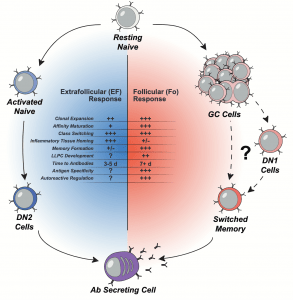Disclaimer: This is a summary of an article that is in a preprint and has not been peer reviewed.
In a pre-peer reviewed publication in MedRxiv, investigators found that critically ill COVID-19 patients had heightened extrafollicular B cells responses which lead to rapid activation of B cells resulting in high proportions of antibody-secreting cells. However, these responses were also associated with high inflammation and poor prognosis. Additionally, the extrafollicular response reported by investigators is reminiscent with that found in patients with flaring Systemic Lupus Erythematosus (SLE), which have been shown to be a TLR-7-driven B cell population event, mediating autoimmune and anti-viral responses (Jenks et al., 2020). The authors conclude that “Serious COVID-19 illness is highly associated with active extrafollicular B cell responses reminiscent of active SLE and other autoimmune disorders. Due to disease heterogeneity, immunomodulatory therapy, including IL-6 inhibition may have discordant effects on different patient groups.”
Pre-Print: WoodRuff et al., Dominant extrafollicular B cell responses in severe COVID-19 disease correlate with robust viral-specific antibody production but poor clinical outcomes. MedRxiv











